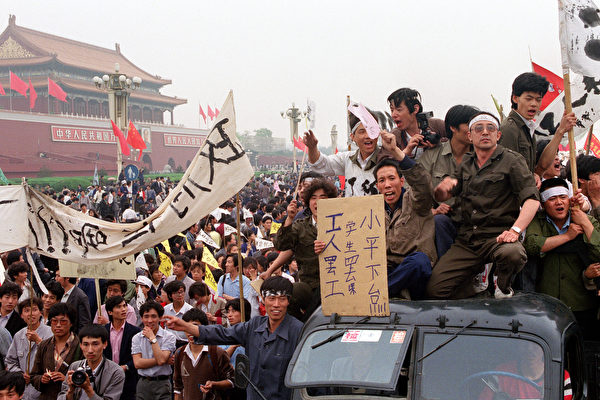In 1989, the sudden death of former General Secretary of the Chinese Communist Party, Hu Yaobang, on April 15 triggered massive mourning and protest activities in Tiananmen Square, spreading throughout the country. People demanded a reevaluation of Hu Yaobang’s legacy and called for economic and political reforms.
Hu Yaobang served as the General Secretary of the CCP from September 1982 to January 1987, during which he overturned many unjust cases. However, his reform initiatives challenged the interests of high-ranking party officials. From December 5, 1986, to January 2, 1987, the “86 Student Movement” erupted nationwide – starting with demands for democratic elections, students advocated for “democracy, freedom, human rights, anti-bureaucracy, and anti-corruption.” On January 1, 1987, dozens of students were arrested in Tiananmen Square, only to be released the next day. Hu Yaobang admitted mishandling the student movement and resigned on the 17th, with Zhao Ziyang acting as General Secretary.
After Hu Yaobang’s death, people surrounded the monument in Tiananmen Square with wreaths, staged sit-ins at the Great Hall of the People, and protested against injustice in his memory. Subsequently, student representatives were denied dialogue with Premier Li Peng. On April 23, more than 20 universities in Beijing formed a temporary alliance (later restructuring as the Gaozi Alliance on April 28) and initiated an indefinite strike.
On April 26, the party’s official newspaper, People’s Daily, labeled the student movement as “turmoil” and a “planned conspiracy” manipulated by “a very few people with ulterior motives.” After the 27th, numerous students from various universities took to the streets, demanding recognition of the Gaozi Alliance as a legitimate organization and rejecting the April 26 editorial. On April 29, representatives from 16 universities engaged in dialogue with State Council spokesperson Yuan Mu, only to have their demands rejected.
On May 1st, during the May Day holiday, I, having graduated from university four years prior, visited Wutai Mountain with friends and stayed in a newly built temple guesthouse. At that time, temple tourism in China had not yet begun, with some ancient temples maintaining a serene, solemn, and pure atmosphere. After sightseeing during the day, we shared dinner with the monks for a small sum. They worked during the day and self-sustained by farming vegetables. Despite occasional pilgrims, their numbers were limited.
After dinner, a layman approached us, saying the abbot wished to see us, even though we had not made any request. In the remote tranquility away from the hustle and bustle, the abbot’s room had a small black and white television where he inquired in detail about the passing of Hu Yaobang and the Beijing student movement.
On the last day before we departed, the layman woke us up to go to the main hall and make a wish. It was my first and perhaps only formal wish – perhaps due to a moment of grace – where I “prayed for the safety of my family and all my friends.” Having visited numerous temples and Buddha grottoes before, I often felt the solemn and sacred atmosphere but never considered making a wish, having grown up under atheistic education.
On May 4th, the Gaozi Alliance issued the “New May Fourth Manifesto.” Two days before the visit of Soviet leader Mikhail Gorbachev to China on May 13, some students began a hunger strike in Tiananmen Square, demanding the government categorize the student movement as a patriotic democratic movement, only to be refused.
As the hunger strike prolonged, concerns heightened about the students’ well-being, prompting more people to gather at the square. After work, we detoured to the square and sat on the stone steps in front of the monument, surrounded by students on hunger strike sitting or lying down. Some had white cloth bands around their heads with words like “hunger strike” and “democracy and freedom,” gradually weakening as medical staff carried them away for treatment. Initially, if students insisted on staying, people would guard them nearby, encouraging each other; later, medical personnel directly carried away those in poor condition.
We stayed there overnight, feeling uneasy and wanting to do something for the students. After the Tiananmen Square massacre, a neighbor, a middle-aged lady, privately thanked me when her son saw me at the square, appreciating the efforts and sacrifices of the students. I felt ashamed, merely a sympathizer and someone wanting to help, lacking the determination of “better to die standing free.”

